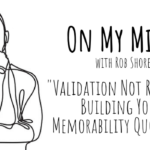You may have a tremendous education.
You may be a whiz kid when it comes to your products, as well as your competitors.
You may have the most well crafted PVP-Peerless Value Proposition® on the street.
But are you lacking the grit it takes reach your highest level of success?
Eric Frazer is a People Developer. As a psychologist he uses his expertise to teach and coach the psychological techniques for top performance outcomes. His approach is to curate the research on topics like grit, habit-setting, goal completion and teach professionals how to do it in fast and simple changes individually, or as an overall strategy for recruiting and the development of existing teams.
Eric has held a part-time faculty appointment at Yale University School of Medicine for the past 15 years.
His version of fun includes ice-climbing, marathons, and being on mountains over 15,000 feet.
GRIT: Building Top Performance Habits Without Burning Out
According to a Harvard Business Review (November 2016) up to 85% of financial professionals are impacted by burnout.
High performers are at greatest burnout risk, and temporary setback can lead to performance slumps with symptoms of exhaustion, cynicism, and feeling ineffective. The stereotypical “Type-A” high-achiever typically tries to solve this by either working harder, taking on more responsibility, and ignoring basic health needs. These efforts are destined to fail.
Here’s the latest curated research that will teach you the easy ways gritty professionals maintain a fierce competitive edge in a world that demands unrelenting hustle:
Identify Commitments
The first step to build grit in oneself is to identify your commitments.
How would you answer these questions:
To what degree am I committed to my professional growth?
My organization?
My customers?
Gritty people have self-prescribed commitments. If you cannot answers these, take a moment and write them down. Brainstorm and narrow down three. As we go through the next several facets of Grit, it will become self-evident why this exercise is important. Still stuck? Have a conversation with a trusted friend or colleague to determine what you really want for yourself professionally.
Where is your compass pointing?
In psychology we call one’s internal compass their Locus of Control. It is either internal or external.
Gritty individuals have an internal locus of control.
They are in charge of their lives, they are the authors of their script and destiny. They assume responsibility for problems, solutions, and outcomes.
People with an external locus of control are not gritty. They attribute failure to external forces: A bad prospect list, a weak territory, a manager who is unsupportive, a company that lacks vision. The list goes on.
Gritty individuals succeed despite any of those contextual circumstances. If there is truth to those factors and the work is toxic, they move on. That is a gritty outcome.
Deliberate Practice
If you’ve read Malcolm Gladwell’s bestseller Outliers, then you’re familiar with the finding that individuals who have engaged in deliberate practice for 10,000 hours is a feature of expert performance.
Deliberate practice is the ‘elbow grease’ of grit.
The long boring hours of research, rehearsal, and other forms of preparation that lead to mastery in any outcome whether it is a presentation, a proposal, a meeting, or a larger project or strategy.
Another attitude that gritty individuals possess is the “why” behind deliberate practice. It is called the growth mindset-a concept written on extensively by psychologist Carol Dwek.
The growth mindset is the belief that to excel and exceed it is necessary to approach one’s work with an attitude of curiosity and the desire for lifelong learning.
Combine that with deliberate practice and success is all but a guaranteed outcome regardless of how you measure it.
What is your practice and learning?
The truth is that most people are “winging it” and not taking time to practice, research, and learn.
When your objectives are not met, the answer is not clear. If you’re not achieving your goals, you need to make a list of skills that you can practice more (listening, negotiating, efficiency, effectiveness, trust, and of course delivering a high quality product or service).
What are you learning more about that will elevate your talent?
Determine if you should be:
- Reading more books or industry journal articles
- Listening to more expert content podcasts
- Going to high value conferences
- Taking a specialized workshop
- Getting coached
- Finding a new mentor or perhaps your first mentor
Superordinate Goals
Everyone has goals.
The problem is people tend to set unrealistic expectations with goal fulfillment.
When the goal does not manifest in a certain amount of time, people give up and chalk it up to external locus of control thinking.
Gritty individuals have lower goals, that create a specific to-do list of steps to achieve the primary superordinate goal. Commit to the exercise of writing down subordinate goals for your primary goal, and then do it. If your goal is to sell a particular product or service, there are many steps leading to that which require diligent work and practice.
Engagement
Gritty individuals care about what they are doing. They have an intrinsic “why” behind their objectives. This is called engagement and is why it ‘matters’. The notion of ‘mattering’ is important as an intrinsic motivator to stick it through the more mundane work to get closer to the higher goal.
If you are unsure why you are engaged, you should take inventory of that.
Your customers will see right through you if you are not engaged with their goals.
You cannot consistently have high-touch relationships without genuine engagement and satisfaction with what you are doing.
The Competitive Advantage Of Developing People
When a Regional Sales Manager at Fortune 100 Tech Company pulled me aside, he confided in me that he had a group of under-performers that were driving him crazy, sucking up all his time, but he couldn’t get rid of them. Actually, he didn’t want to get rid of them, but he didn’t know what to do to ignite a new spark to get them back up to their potential.
You could say they were Grit deprived.
Deeper into the conversation, we also identified that there really was no system to hire top-talent. People floated from interview to interview under major time demands and the managers and directors went with their ‘gut’ in many instances without really identifying what predicted future success for that hire. Even more surprising was that HR had no procedure to truly tap into assessing top talent predictors.
Fast Company reported in a CareerBuilder survey that on average one bad hire cost more than 50k each.
Here’s three final points to consider for your next strategic move.
- Top talent hires generate revenue, and naturally lead your organization forward.
- Gritty high performers don’t requirement management, they require engagement.
- The cost and misery of bad hires will set you back and regularly disrupt your progress.
Written by Eric Frazer


 33 Technology Ideas Wholesalers Can Use to Improve Their Practice: Wholesaler Tech Talk with Austin Young
33 Technology Ideas Wholesalers Can Use to Improve Their Practice: Wholesaler Tech Talk with Austin Young What To Do When There’s Too Much To Do with Matt Johnson
What To Do When There’s Too Much To Do with Matt Johnson Advisors Don’t Care How You Feel with Steve Gutzler
Advisors Don’t Care How You Feel with Steve Gutzler On My Mind – Validation Not Required: Building Your Memorability Quotient
On My Mind – Validation Not Required: Building Your Memorability Quotient Five Star Service and Attention to Detail: The Benefits to Your Practice with Bruce Himelstein
Five Star Service and Attention to Detail: The Benefits to Your Practice with Bruce Himelstein